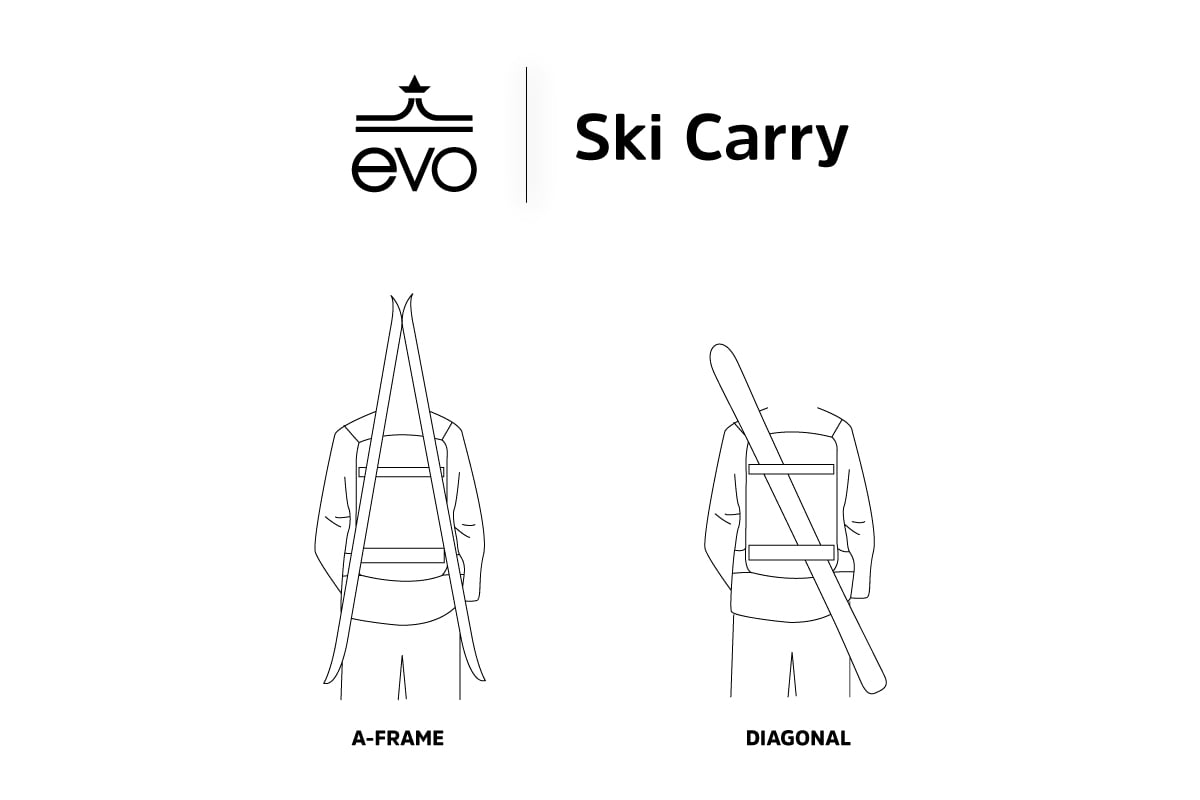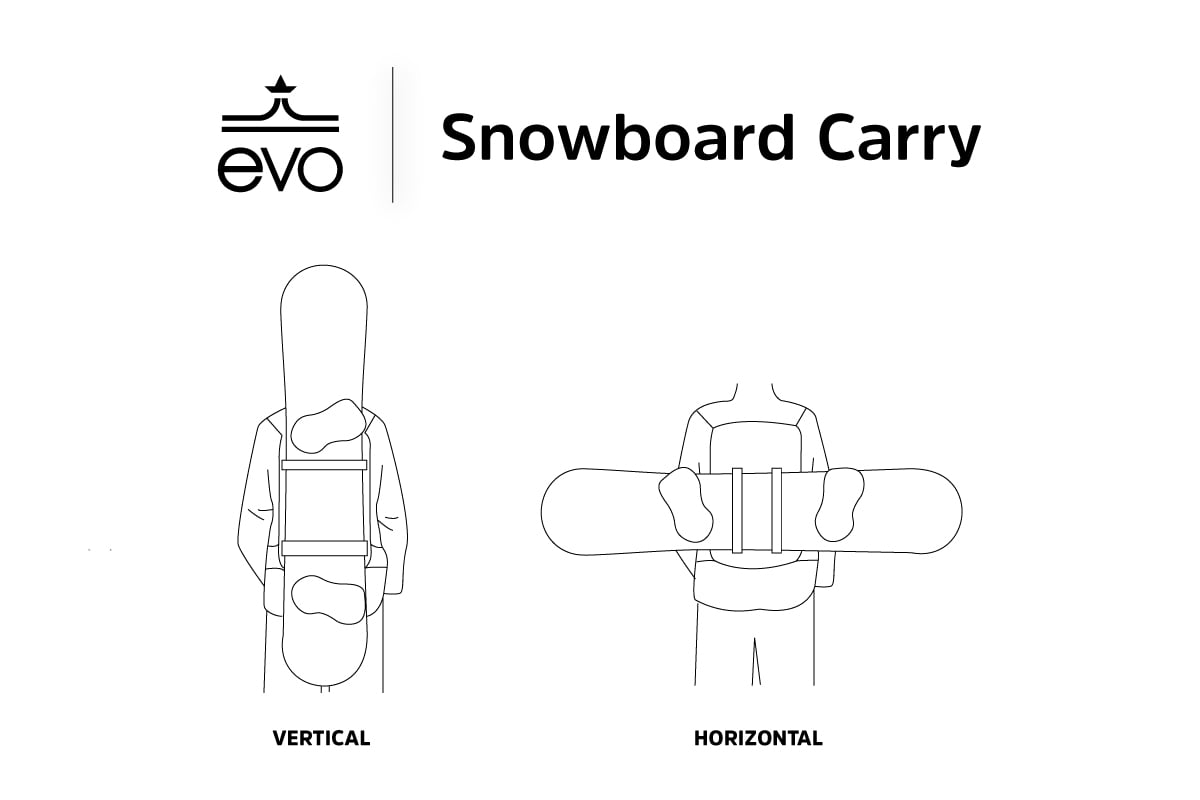How to Choose a Backpack for Backcountry Skiing and Snowboarding
What Makes a Backcountry Backpack Different From a Hiking Backpack?
A backpack is a backpack, right? Well, not exactly. Backpacks designed for backcountry skiing and snowboarding come with specialized features designed to make traveling through backcountry terrain as smooth as possible. The two most common, not to mention useful, features include dedicated compartments for avalanche safety gear, and special attachment systems for skis or snowboard carry.
- Separate Storage of Avalanche Safety Gear:
- Having your shovel and probe easily accessible is a must. Avalanche rescues are extremely time sensitive, so it's no good if you have to waste precious seconds sorting through your backpack trying to locate your equipment. The vast majority of backcountry backpacks include a dedicated safety gear compartment. These will usually include separate sleeves to hold your probe and shovel handle securely, keeping everything organized for easy access should an avalanche situation arise.
Look for a backpack that has a fully waterproof safety compartment with drainage holes. This can be a great place to store soggy skins during the descent, and protects gear in the main compartment from getting wet. Avalanche safety gear should always be stored inside the backpack, not strapped on the outside where it can snag and be lost during a fall. - Ski/Snowboard Carry:
- Backcountry travel sometimes requires you to remove your skis to bootpack up steep, technical sections. Shouldering your skis or snowboard is not always desirable or possible, so it's important to be able to attach your skis or snowboard to your pack. A strap carrying system allows you to hike while leaving your hands free.
Ski - The two main carry systems are diagonal (skis together vertically or at an angle on the back of the pack) or A-frame (skis strapped separately to the sides of the pack and sometimes connected at the tips by a strap).

Snowboard - The two main methods are vertical (straight up and down on the back of the pack) or horizontal (sideways across the pack).
The style of carry is usually a personal preference, but keep in mind how and where you'll be traveling. While an A-frame carry may be more balanced, your gear might snag on brush or rocks when clearances are tight, especially if you have your boots in the bindings. This can also apply to snowboards carried horizontally. Diagonal carry systems can sometimes drag your ski tails on steep descents, especially if the straps are low. Some pack designs allow more than one style of carry for greater versatility, or allow you to carry either skis or a snowboard.
What Size Should a Backcountry Backpack Be?
Backcountry packs range from minimalist options with space for little more than your avalanche safety gear, to much larger packs designed for multi-day expeditions. Start by determining where you’ll be using this backpack and what sort of riding you’ll be doing with it. Are you riding lift served sidecountry or heading out into remote wilderness? How long will you be gone, and what additional gear will you need to support your objectives?
The length of your trip and the amount of gear you need to carry will determine your size of backpack. Pack volume is usually measured in liters (L), and the following general guidelines apply:
- 10-20L - Lift-served side country, heli or cat accessed riding
- 20-35L - Longer day tours
- 35-55L - Multi-day hut touring and overnight winter camping trips
- 60-70L - Longer mountaineering trips that require a tent, cooking equipment, and additional technical gear
How Should a Backcountry Backpack Fit?
Consider the layers and outerwear you'll be wearing when using this backpack. Some backpacks come in different lengths, and your pack length should match your torso length to ensure the most comfortable fit. Consult the manufacturer's fit chart to determine which length is best for you.
When you try a pack on for size, put some weight inside to simulate a typical full load, then see if the straps and waistbelt adjust for a comfortable fit. It's imortant that your backpack fits comfortably and securely, even with your skis or snowboard attached.
Do I Need an Avalanche Airbag?
Airbag packs are built to keep avalanche victims at or near the snow’s surface. Research on avalanche airbag system packs indicates that wearing an inflated airbag greatly increases one's chances of survival in an avalanche. In the early stages of an avalanche the surface snow moves much slower than the deeper debris, therefore the skier with an airbag is usually taken for a shorter ride and experiences less trauma. Airbags can protect the head and neck from blunt trauma, and decrease the liklihood of burial. Check out the guide below to see if an Avalanche Airbag is right for you.
What is an Avalung®?
An AvaLung is a breathing apparatus that integrates into certain packs, allowing a victim to pull oxygen from the surrounding snowpack while exhaling carbon dioxide away from their face. The AvaLung can extend the duration of burial before asphyxiation occurs. While are becoming less common, you may still come across some packs that incorporate one.
What Other Features Should a Backcountry Backpack Have?
The very best backcountry backpacks come with a plethora of thoughtful features designed to make life on the skin track a little easier. The following list is by no means exhaustive, but includes a few of our favorite things to look out for.Hydration Compatibility
If you plan to carry a hydration bladder, check for a separate compartment to protect the bladder and an exit port for the hose.
Back or Side Access Zippers
Having a way to access items at the bottom of your pack without unloading all of the contents can be a huge time saver.
Ice Axe Carry
A loop or loops at the front bottom of the pack along with easy-fasten tabs or straps to secure one or two ice tools is essential for ski mountaineering trips.
Daisy Chain Gear Loops
These loops on the back of the pack make carrying climbing hardware or crampons on the exterior of the pack simple, and help protect the pack fabric.
Helmet Carry System
An elastic flap or pouch that secures your helmet while you're not wearing it and keeps it from bouncing.
Compression straps
These side straps can be tightened to reduce the bulk of a pack for light days.
We recommend that backcountry travelers take an AIARE Level One class or equivalent and practice the skills they learn there regularly with their partners. Here are some great resources for avalanche safety education:
— American Institute for Avalanche Research and Education
— American Avalanche Association
— Northwest Weather and Avalanche Center
— Avalanche Canada
You should carry an avalanche beacon, shovel and probe when travelling in avalanche terrain and know how to use them. Backcountry travel requires an acceptance of the risks involved (avalanches are not the only danger) and implies a willingness to take responsibility for educating oneself about these dangers and ways to mitigate them.
Learn More With Our Other Backcountry Guides:
Backcountry Basics - How to Get Started
Splitboarding - How to Get Started
How to Skin for Backcountry Travel
How to Trim or Cut Climbing Skins
Backcountry Gear Checklist
How to Choose Alpine Touring Skis
How to Choose Alpine Touring Ski Boots
How to Choose Alpine Touring Bindings
Getting Started with Dynafit (Tech) Bindings
How to Choose Climbing Skins
Climbing Skins Size Guide
Climbing Skins Weight Chart
How to Dress for Backcountry Skiing & Snowboarding
This is evo. We are a ski, snowboard, wake, skate, bike, surf, camp, and clothing online retailer with physical stores in Seattle, Portland, Denver, Salt Lake City, Whistler, and Snoqualmie Pass. Our goal is to provide you with great information to make both your purchase and upkeep easy.
evo also likes to travel to remote places across the globe in search of world-class powder turns, epic waves, or legendary mountain biking locations through evoTrip Adventure Travel Trips. Or, if you prefer to travel on your own, check out our ski & snowboard resort travel guides and mountain bike trail guides.
Still have questions? Please call our customer care team at 1.866.386.1590 during Customer Care Hours. They can help you find the right setup to fit your needs.

